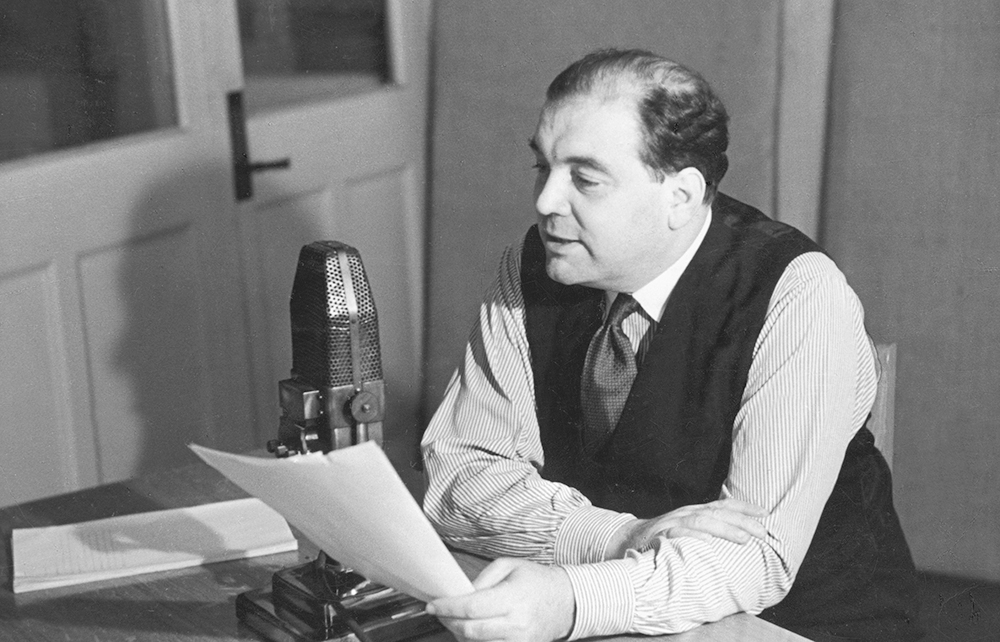There is an obvious problem with trying to judge who ‘won’ a propaganda war. Unlike its physical counterpart, there is virtually no real-world evidence either way, and everyone involved has spent years learning how to spin, manipulate and outright lie about reality to try to shape it into what they want. As a result, it remains the conventional wisdom – among those who think of such things, at least – that despite their eventual and total defeat in the second world war, it was the Nazis who won the propaganda war of their era.
Fake letters from dead German soldiers to their parents reported thatthey had survived, deserted and were now safe
British efforts at demoralisation and appealing to the better nature of German citizens or soldiers were often naff, and where they weren’t, they were hampered by the government’s insistence on ‘unconditional surrender’ from Germany, with no carve-outs – long said to be one of the best propaganda tools to keep Germans unified behind the Nazi party.
How to Win an Information War is an effort to counter that prevailing narrative, arguing that a morally ambiguous black ops propaganda operation, led by the Daily Express journalist Sefton Delmer, offered an effective counter to the Nazi operation, but grounded it in free-thinking – as opposed to the Nazi theory that people wanted to be led.
From this, Peter Pomerantsev, a Ukraine-born senior fellow at the Johns Hopkins Institute, draws frequent parallels to the modern propaganda challenges of tackling disinformation and false narratives, mostly grounded in the Russia-Ukraine conflict. It is a riveting, revisionist and subtle retelling of second world war propaganda, though one whose lessons for today are at best ambiguous.
Delmer might have agreed with the mainstream telling of Britain’s propaganda efforts in the early years of the war, as at the time he was sidelined (with mounting frustration), owing to his birth in Germany and Australian parentage. (Throughout his career he was plagued by the question of whether or not he was truly ‘one of us’.) But, as Pomerantsev recounts it, those who doubted him had good reason to do so. As the Express’s Berlin correspondent, Delmer had cultivated close connections and even friendships with senior Nazis during the early 1930s – all the while apparently reporting back to the British government that they needed to act against them, and soon.
It is when Delmer was eventually gifted his own propaganda unit that the book really comes to life. While other British efforts attempted to appeal to the better angels of the Germans’ nature, Delmer aimed far lower – trying to foment strife over unfair allocations of rations and coupons, highlight corruption among party officials, and more.
For this he first used a character nicknamed Der Chef (the chief), who would rail against Winston Churchill, Jews and the Brits in a way no British propaganda effort would ever dare to do. With this credibility and genuine leaked information from the regime, Delmer cemented his efforts.
His later schemes were more subtle, culminating in a radio station offering mostly accurate information, purporting to be from official German sources, which most listeners would nonetheless know originated from Britain, at a time when knowingly listening to British radio transmissions was punishable by death.
Pomerantsev uses this development to dissect the performative nature of propaganda, and how with this station and the elaborate dance between broadcaster and listener, Delmer changed it:
Here was a radio programme pretending to be Nazi, which understood that its listeners knew it wasn’t, and whose listeners tuned in because they needed the emotional and physical safety of play-acting as if they thought it might be Nazi after all.
Delmer was the dirtiest of dirty tricksters. He sent letters and gift hampers to the parents of dead German soldiers, claiming to be from those dead troops, saying they had survived, deserted and were living prosperously in safe countries beyond the war. He broadcast letters from alleged witnesses to faked brutality against soldiers in military hospitals, telling families the soldiers had been deliberately killed by those supposed to care for them. Anything to encourage desertions and break morale was considered allowable.
Despite that, Pomerantsev still believes there was an element of idealism in Delmer’s worldview, arguing that all his efforts were aimed at encouraging freethinking and small-scale rebellion against a regime which demanded compliance above all else. The propaganda, he argues, may have been dirty, but it was trying to liberate people rather than tie them down.
From this, Pomerantsev draws his parallels with the present day. Neither picking at petty facts nor appealing to the highest ideals is effective at countering propaganda. Instead, you must start where your audience is – at what is grinding them down and causing resentment – and turn those issues to your own ends. The sections at the ends of chapters in which the author draws those parallels most directly are the least effective in the book, though they are understandable, given the existence of an ongoing conflict in which so many of these themes are relevant.
Pomerantsev is not a propagandist for his subject, either. He reports the many ways in which Delmer’s efforts may have backfired or ‘boomeranged’ on either the UK as a whole or on himself, acknowledging that Delmer was an unreliable narrator, and that the idea of who ‘wins’ a propaganda war is an unknowable one.
Winning such a war may even be an impossible task. But anyone likely to engage in one would be better off for reading Pomerantsev’s book first.






Comments